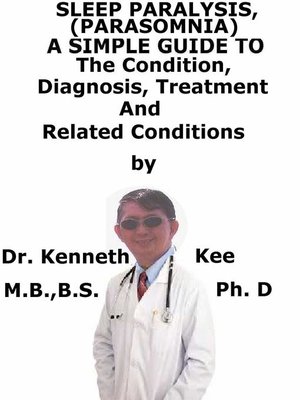Sleep Paralysis, (Parasomnia) a Simple Guide to the Condition, Diagnosis, Treatment and Related Conditions
ebook
By Kenneth Kee

Sign up to save your library
With an OverDrive account, you can save your favorite libraries for at-a-glance information about availability. Find out more about OverDrive accounts.
Find this title in Libby, the library reading app by OverDrive.



Search for a digital library with this title
Title found at these libraries:
| Loading... |
This book describes Sleep Paralysis, Diagnosis and Treatment and Related Diseases
Ever woken up in the in the night or morning and felt that you are unable to move the body from the bed as though paralyzed: that is the case of a person experiencing sleep paralysis.
You feel as though that there is a weight pressing on your chest preventing you from sitting upright.
You cannot even move your lips to call for help.
There seems to be some one or some thing strange watching you, frightening you.
After a minute of fear, you suddenly rise from your bed and rush to switch on the lights.
Sleep paralysis happens when the patient temporarily cannot move or speak upon waking up or falling asleep.
Sleep paralysis is a temporary loss of muscle function while the patient is sleeping.
It normally happens:
1. When a person is falling asleep,
2. Shortly after the patient has fallen asleep, or
3. When he or she is waking up.
While sleep paralysis is fairly frequent and does not cause any physical harm, it can be frightening.
There are some things the patient can do to decrease the risk of having an episode.
During some stages of sleep, the body goes into a temporary paralysis, which may stop the patient from acting out any dreams.
Paralysis during sleep is normal, but the patient is normally not aware of it since the patient is asleep at the time.
If this 'off switch' persists for a few seconds to a few minutes after the patient wake up, the patient will be fully aware of being paralyzed.
The patient may find it distressing that he or she cannot move or talk, even though the patient can hear normally.
Sleep paralysis normally happens just as the patient is waking up, but can happen when the patient is falling asleep.
Episodes of sleep paralysis can occasionally involve hallucinations, which may be frightening.
The patient may sense that there is an intruder in the room.
Sleep paralysis is more frequent in adolescence and normally disappears as the patient get older.
It is not known to cause any medical risk.
Those with sleep paralysis normally have this disorder for the first time between 14 and 17 years old.
It is a fairly frequent sleep disorder.
Doctors estimate it happens in anywhere between 5 and 40 percent of people.
Episodes of sleep paralysis may happen along with another sleep disorder known as narcolepsy.
Narcolepsy is a chronic sleep disorder that produces overwhelming drowsiness and sudden "sleep attacks" throughout the day.
Many people who do not have narcolepsy can still have sleep paralysis.
This disorder is not dangerous.
Though it can feel alarming to some, no medical intervention is normally required.
Sleep paralysis may happen on its own.
It is not necessarily a sign of any disorders.
Sleep paralysis may also be related to medical disorders, such as migraine, mental health (anxiety), obstructive sleep apnea, and a long-term brain disorder called narcolepsy.
People with narcolepsy have excessive daytime drowsiness and sudden episodes of sleep, regardless of the situations.
Sleep paralysis is also linked to:
1. Not getting enough sleep (sleep deprivation or insomnia) or having regular disturbances to sleep such as shift work
Inadequate sleep may also raise the danger of sleep paralysis.
2. Irregular sleeping patterns, such as those felt by shift workers or students, or due to jet lag
Having a disturbed sleep schedule has also been linked to sleep paralysis.
The sleep schedule can be disturbed during working night shifts or being jet...






